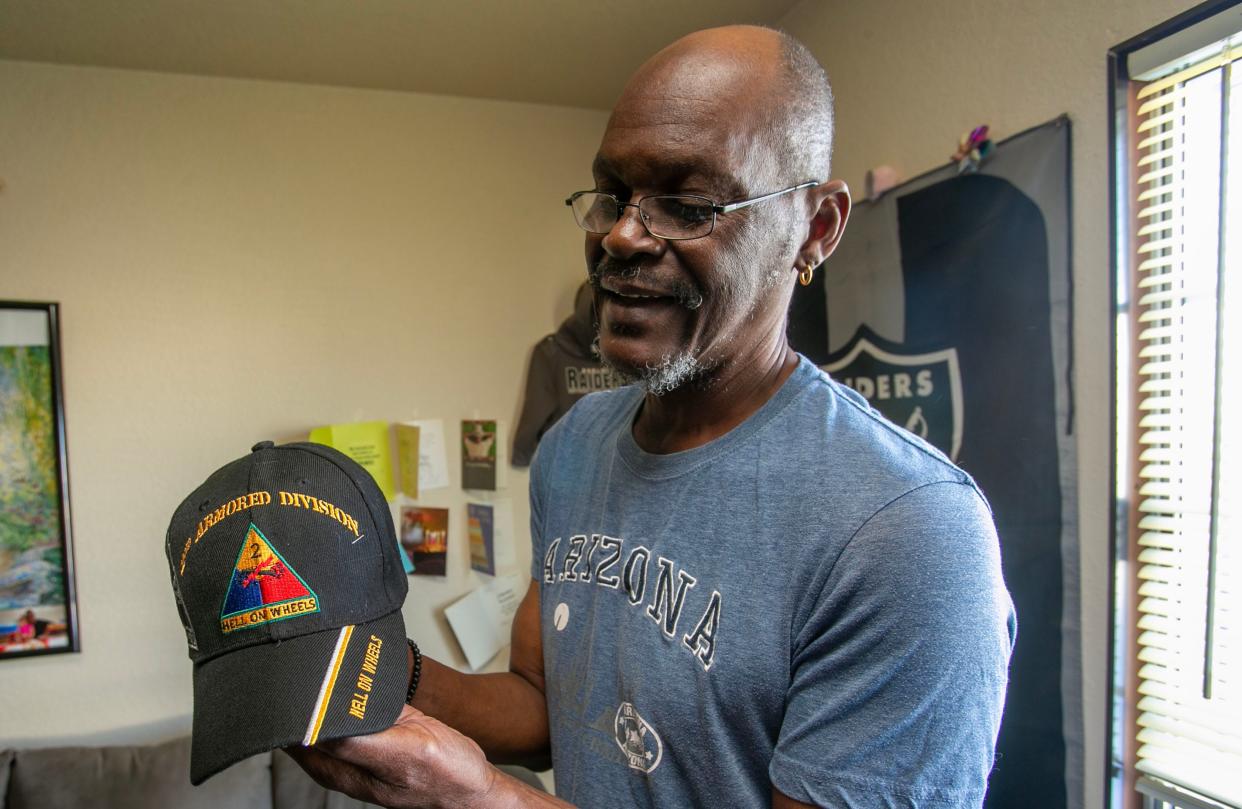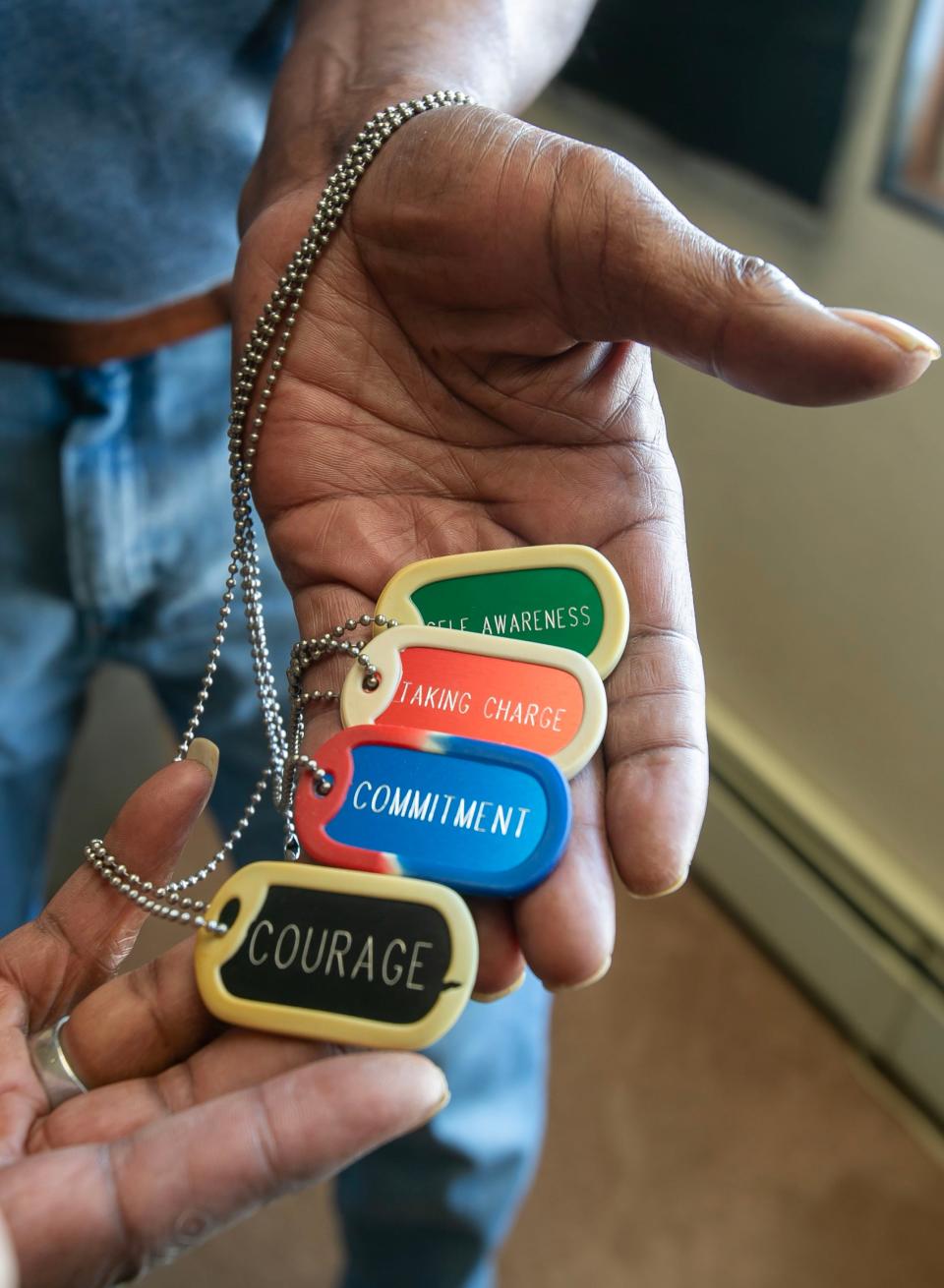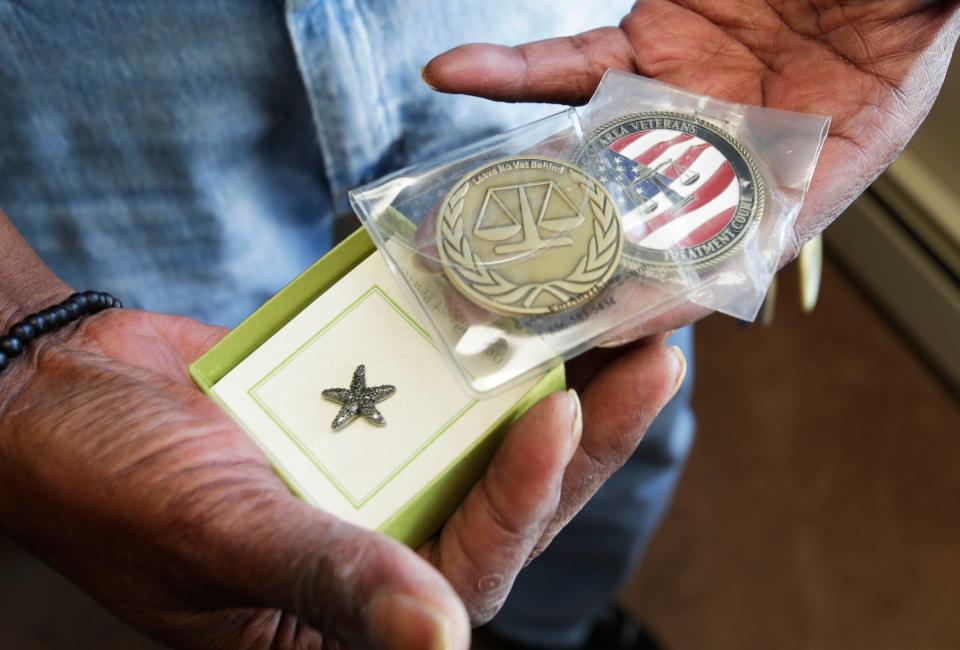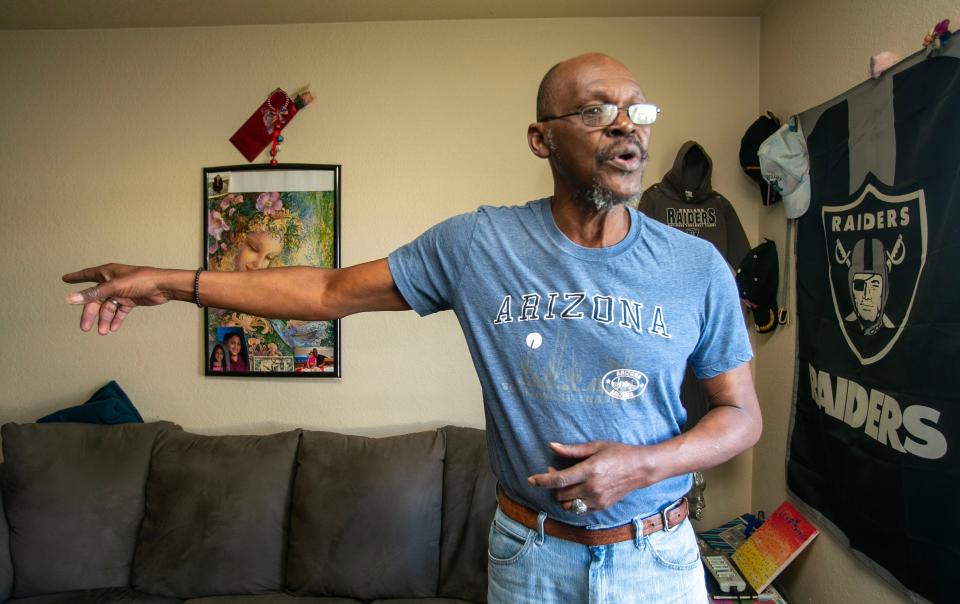Teddy Henderson is one of 41 graduates of Sheboygan Area Veterans Treatment Court. Here's how it helped him find hope after years of turmoil.

SHEBOYGAN - Teddy Henderson, 64, became very negative after his second marriage ended in divorce in 2008.
He felt mad at the world, but didn’t understand why.
He had moved from California to Oklahoma with his wife and children, but decided to move back after the marriage ended.
Henderson sought help and met with a psychiatrist. He was diagnosed with post-traumatic stress disorder.
It could’ve been from his military injury or trauma he experienced during his life, he said.
"It was scary. It was nerve-racking,” he said. “On certain days of the year, I would start reminiscing and I would start having flashes. Just bad dreams about all the death I've witnessed in my life.
"She (the psychiatrist) explained to me that could weigh a lot on a person over the years,” Henderson said. “It might not show today, but it could show tomorrow, and it could happen unexpectedly.”
Henderson joined the U.S. Army in 1976, serving in active duty as an airborne ranger. After four years, he joined the military police in California. A bullet hit his right heel during training, and he was medically discharged in 1984.
Henderson has also witnessed the loss of many loved ones, sometimes holding them in his arms as they passed away.
His oldest brother died in a car crash, and he saw his other brother die from gun violence.
He lost his mom and first wife to breast cancer. He was there when his father passed, too.
He lived in California for a year-and-a-half after getting divorced, but it dredged up bad memories. He decided to move to Wisconsin near his youngest son and first grandchild.
Veterans Treatment Court was a 'godsend'
After moving to Sheboygan, Henderson said he befriended an elderly neighbor living in the same apartment complex. The neighbor told him she didn’t have a lot of contact with her family.
He said he started helping her with different tasks like driving her to doctor’s appointments and the grocery store. Henderson also cooked for her and invited her to several family events.
After a year-and-a-half, Henderson said the neighbor's daughter came to visit her and asked what she was doing with her money.
The neighbor didn’t want to tell her daughter she was giving it to Henderson and was convinced by her daughter to press charges against him, he said.
“I'm like, ‘Well, I wasn't taking anything.’ Everything that I was getting, she was giving to me because I was doing things for her that her family members weren't doing,” Henderson said.
Henderson’s children wanted him to fight the charges brought against him, but he didn’t want to.
“I didn't think that it would be an issue all the way up to the point to where I had to go to court about it,” he said.
Henderson said other residents in the apartment complex warned him about the neighbor, but he doesn’t go by hearsay; he’d rather learn those types of things for himself. He found out the hard way that they were telling the truth, he said.
When the case went to court, he felt he had to accept responsibility for mistakenly befriending the neighbor.
“I'm a Christian, and there's no such thing as a saint as far as I'm concerned," he said. "At one point or another, somebody's going to do something wrong — be it this or be it that.
“But it takes a big person to admit, ‘OK, I'm wrong. I'm willing to face the consequences of my actions,” he continued.
Henderson was found guilty of identity theft and burglary after no-contest pleas.
He said he had a nervous breakdown in court, and the judge referred him to a psychiatrist who treats veterans with PTSD.
With no priors and needing more support, Henderson was accepted into the Sheboygan Area Veterans Treatment Court.
“It was a godsend,” Henderson said.
Support, accountability and honesty are key to program
Rick Cawthon, Good News Jail & Prison Ministry Chaplain and Air Force veteran, has seen veterans “trying to feel normal” when they return home by using drugs or alcohol. They may end up getting involved in the judicial system when they need treatment instead.
“It’s like a whirlpool that just pulls them down, and they have a very hard time ever getting out of it,” Cawthon said.
Veterans may face depression, anxiety, traumatic brain injury, PTSD or substance abuse disorder after service but may not receive necessary treatment.
Veterans Treatment Court, first founded by Judge Robert Russell in Buffalo, New York, in 2008, offers veterans an alternative path to address underlying behavioral health issues that have contributed to a criminal offense.
Sheboygan County established a veterans court in 2012, the first treatment court in the county and the second veterans court in the state.
When Branch 3 Judge Angela Sutkiewicz and others connected with veteran groups and the County Board to get their support, she said not everyone understood what a treatment court was. Some people hadn’t even heard of one before.
“It was kind of a hard sell,” Sutkiewicz said. “I kept getting comments like, ‘Oh, this is just a way for them to get out of jail.’ It really is hard work.”
To be accepted into the program, the veteran enters a voluntary plea and they, along with the defense, prosecutor and judge, have to sign a contract.
Veterans work with the Veterans Justice Outreach Coordinator to develop a treatment plan upon entry, which can include community support groups, service and possibly Moral Recognition Therapy, a program that changes thinking patterns and assesses root causes of issues.
Veterans also pair with mentors to coach and support them, who Sutkiewicz said are the “backbone of the court.”
She said veterans court is about “believing in yourself. It's having other people believe in you. And that's why that mentor is so important.”
Mentors don’t do the work for the participant; they’re a supporter.
Cawthon said the role of a mentor is similar to a “battle buddy” in the military.
“You always got somebody that's going to be there for you,” he said.
Cawthon uses the term "battle buddy" when talking about the mentor-participant relationship because “they understand that means you look out for them, you're there for them.”
The treatment court accepts veterans on a case-by-case basis. It’s a rigorous program and can take an average of 18 months.
The program is four phases. If a participant relapses, they have to start the phase over again.
Sutkiewicz said some people “would probably just rather serve their time in jail than have to really look at the root of their problem.”
Forty-one veterans have completed the treatment court in Sheboygan.
Upon completion of the program, veterans may have charges reduced, knocked down from a felony to a misdemeanor or face probation instead of jail time.
Honesty, accountability and responsibility are integral to the program, but it’s not about punishment — it’s about recovery and rehabilitation.
“If you make it through, if you do the hard work, the focus really is to have you have a good life,” Sutkiewicz said.
A second chance

Receiving dog tags at the end of each phase reminded Henderson of graduating military boot camp.
“I felt I’ve achieved,” he said.
Henderson graduated from veterans treatment court in 2020. He said it made him a better person. He feels more mellow, more down-to-earth.
“It just changed my life dramatically,” he said. “I never came across so many loving and caring people in one place in my life.”

He leaned on his mentor and others for support. He utilized negativity as a means of motivation. He felt he had a second chance.
Henderson said he could “prove that I was a better person than I was being portrayed to be."
With the charges brought against him, Henderson was facing up to three-and-a-half years of jail time. Agreeing to participate in veterans court allowed him to received treatment to address burdens from his personal and military life he has carried for years. He's on probation and paying back restitution, which he hopes to finish in July.
'Blessed' and ready to support veteran peers

Henderson said he’s “doing good. I’m really doing good.”
He’s gained his regular weight back and is sleeping better. He said he was drinking a lot, too, but he quit.
“By me being in this program, I could do no drinking at all. … I'm not going to say it made me (stop drinking), but it was either do or die.
“It was something that I did not because I was made to do it,” he continued. “It's because I knew deep down that if I had to do it, I could. And I did.”
He has befriended other veterans in his apartment building, and they grab breakfast once a month. He takes walks, reads at his granddaughter’s school and spends time with his family.
“I've learned to accept what life has to offer me,” he said. “When my children tell me, ‘Dad, you've come a long way,’ and (I'm) one of the strongest people that they know — that made me feel good ... because I think my children know me better than anyone probably ever knows me.”
Henderson said he doesn’t have negativity toward anyone or any regrets about what happened.
He shared a piece of advice he learned from his grandfather when he was younger: “Everybody makes mistakes. The only difference is good people live up to the mistakes and accept the mistakes that they made and try to go on with life. Some people just dwell on it.”
With the impact the program had on him, he's thinking about becoming a mentor.
“I'm blessed,” he said. “I have to say that I am blessed, and I think it's because of this program.”
Contact Alex Garner at 224-374-2332 or agarner@gannett.com. Follow her on Twitter at @alexx_garner.
This article originally appeared on Sheboygan Press: Sheboygan Veterans Treatment Court helped Teddy Henderson find hope

